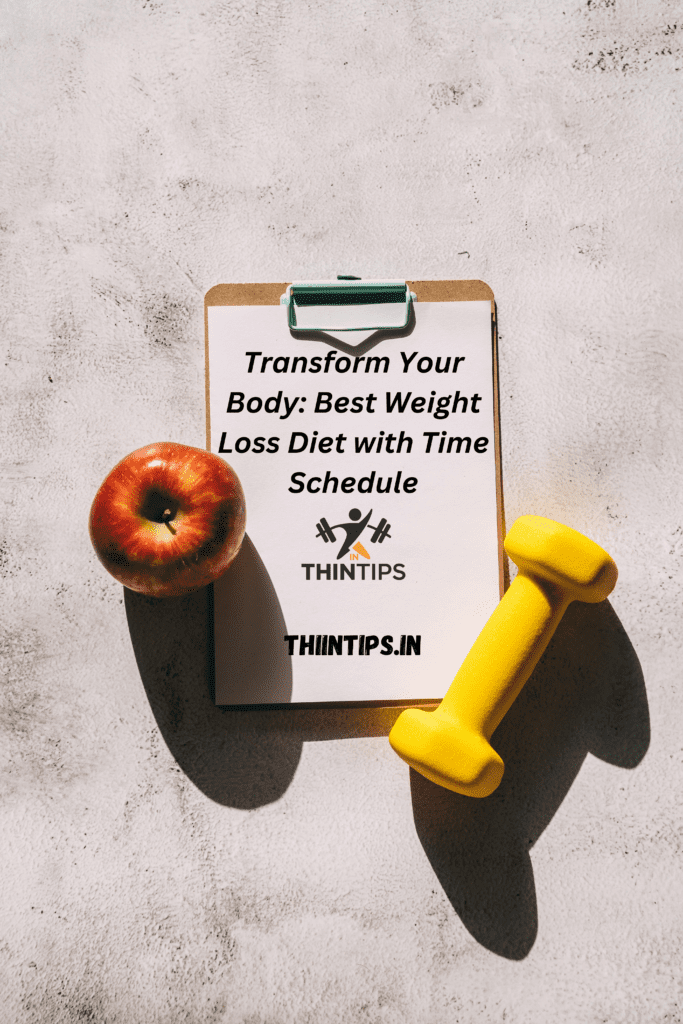Are you tired of fad diets and quick fixes? Do you want to achieve sustainable weight loss? Look no further! Our comprehensive guide outlines the best weight loss tips and diet plan with a time schedule to help you reach your goals.
Understanding Weight Loss
Losing weight is a difficult process that is impacted by macronutrients, calories, and lifestyle choices. A successful weight loss plan considers:
The complicated process of losing weight is influenced by:
- Calories
- Macronutrients
- Lifestyle habits
- Physical activity
- Sleep
A successful weight loss plan considers:
- Caloric deficit
- Macronutrient balance
- Meal frequency
- Portion control
Best Weight Loss Diet Plan:

Our recommended diet plan focuses on:
- Whole foods
- Balanced macronutrients
- Strategic meal timing
Macronutrient Breakdown:
- Carbohydrates: 45-55%
- Protein: 30-35%
- Fat: 20-25%
Meal Frequency:
- 5-6 meals/day
- 3 main meals
- 2-3 snacks
Sample Meal Plan:
Monday:
- Breakfast: Oatmeal with banana, almond milk (350 calories)
- Snack: Carrot sticks with hummus (150 calories)
- Lunch: Grilled chicken breast with quinoa and broccoli (450 calories)
- Snack: Apple slices with peanut butter (170 calories)
- Dinner: Baked salmon with sweet potato and green beans (520 calories)
Tuesday:
- Breakfast: Greek yogurt with berries, granola (300 calories)
- Snack: Hard-boiled egg (78 calories)
- Lunch: Turkey and avocado wrap (500 calories)
- Snack: Cottage cheese with cucumber (150 calories)
- Dinner: Grilled turkey breast with roasted vegetables (500 calories)
Time Schedule for Weight Loss:
- 7:00 AM: Wake up, hydrate
- 7:30 AM – Breakfast
- 10:00 AM: Snack
- 12:30 PM – Lunch
- 3:00 PM – Snack
- 6:00 PM – Dinner
- 8:00 PM: Relaxation/physical activity
Also Read: Yoga for Weight Loss: A Step-by-Step Daily Routine
Tips for Success:
- Drink 8-10 glasses of water/day
- Incorporate 150 minutes/week of moderate exercise
- Get 7-8 hours of sleep/night
- Monitor progress with a food diary
- Avoid processed foods
- Eat mindfully
Conclusion:
Achieving weight loss requires patience, dedication, and a well-structured plan. Our best weight loss diet with time schedule provides a comprehensive framework for success. Combine this plan with regular exercise and lifestyle modifications to transform your body.
Get personalized plans, nutrition counseling, and fitness guidance from our health professionals. Achieve sustainable weight loss and improve overall health. Contact us: info@thintips.in.
1. What is the best weight-loss diet?
The best weight loss diet combines whole foods, balanced macronutrients, and portion control. Focus on vegetables, fruits, lean proteins, and whole grains. Avoid processed and high-calorie foods. Include healthy fats like nuts, seeds, and avocado. Consult a registered dietitian for personalized guidance.
2. How much weight can I lose in 2 weeks?
Safe and sustainable weight loss is 1-2 pounds/week. Aim for 4–8 pounds in 2 weeks with a healthy diet and regular exercise. This rate varies depending on starting weight and body composition. Combine diet with 150 minutes/week of moderate exercise. Monitor progress and adjust your plan.
3. What is the ideal meal frequency for weight loss?
Eat 5-6 meals/day, including 3 main meals and 2-3 snacks. Space meals 2-3 hours apart to maintain metabolism. Choose nutrient-dense foods, avoiding empty calories. Include protein, healthy fats, and complex carbohydrates. Adjust meal frequency based on individual needs.
4. What foods should I avoid for weight loss?
Avoid sugary drinks, fast food, processed snacks, and high-calorie foods. Limit saturated and trans fats, salt, and added sugars. Opt for whole, nutrients-dense foods instead. Read food labels and choose healthier alternatives. Be mindful of portion sizes.
5. How much water should I drink for weight loss?
Drink 8-10 glasses of water per day to aid digestion and metabolism. Stay hydrated to boost energy and suppress appetite. Monitor urine color to ensure proper hydration. Adjust intake based on activity level and climate. Make water your primary beverage.
6. Can I lose weight without exercise?
While possible, exercise enhances weight loss. Regular physical activity boosts metabolism and burns calories. Aim for 150 minutes/week of moderate exercise. Combine exercise with a healthy diet for optimal results. Consult a fitness professional.
7. What is the best time to eat for weight loss?
Eat breakfast within an hour of waking. Have lunch at noon and dinner 3-4 hours before bedtime. Space meals 2-3 hours apart. Listen to your body’s hunger cues. Adjust meal timing based on lifestyle.
8. How do I create a weight loss meal plan?
Consult a registered dietitian or use online resources. Plan meals around whole foods and portion control. Consider macronutrient balance and meal frequency. Make a grocery list and shop smart. Review and adjust your plan regularly.
9. What are the benefits of a weight-loss diet?
Benefits include improved health, increased energy, and enhanced self-confidence. Weight loss reduces chronic disease risk. Achieve better sleep, digestion, and mental clarity. Celebrate small victories along the way. Maintain a healthy lifestyle.
10. How long does it take to see weight loss results?
Noticeable results appear within 4-6 weeks of consistent diet and exercise. Progress may vary depending on individual factors. Monitor weight, measurements, and body fat percentage. Celebrate small victories and stay motivated. Adjust your plan as needed.
